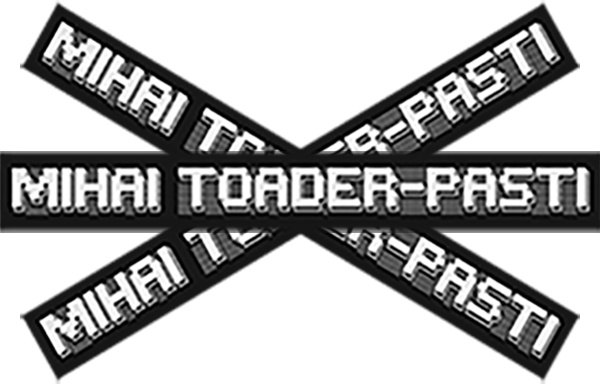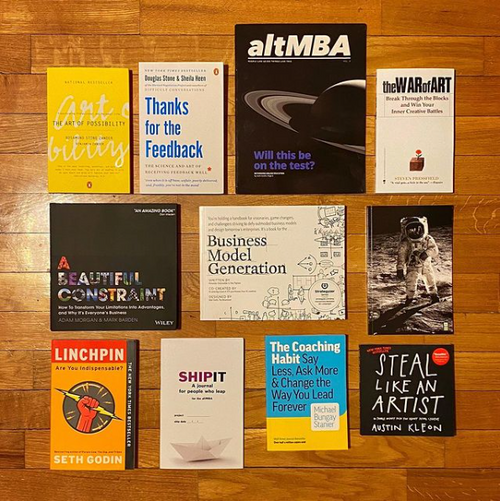La începutul programului altMBA ne-au trimis 9 cărți pe care chiar cred că ar fi trebuit să ni le trimită mai devreme, o listă cu 99 de cărți și încă una extinsă. Dincolo de resurse, experiența este una colaborati-vă și suprinzător de utilă pentru un program online. Dacă vrei să aplici și vrei să afli mai în detaliu, scrie-mi.
Un MBA este extraordinar de util, iar pentru mine altMBA a fost cea mai potrivită soluția ca durată + acces + cost. Fiind dedicat complet EFdeN, nu aș fi putut pleca fizic, dedicat prea mult timp, iar costul a fost unul ok. Pentru a îndeplini Agenda2030 a ONU, ce cuprinde 17 Obiective de Dezvoltare Durabilă și 169 target-uri ai nevoie de Parteneriate și Proiecte cu impact semnificativ, scalabile și dezvoltate eficient cu resurse minime.
- The product adoption lifecycle: New ideas move through a population in predictable ways. [Rogers, Crossing the Chasm]
- The job is to make change: Great organizations change their people, and thus the culture. [Who Do You Want Your Customers to Become 4,book]
- Learn how to talk about your project: Projects are at the heart of our new economy. [What is it for?]
- How to make decisions: Change presents opportunities. Smart decisions defeat dumb ones. [Smart Choices book, Dan Ariely at TED]. Dumb does not mean irrational. [Kahneman and Tversky]
- The resistance: Knowing what to do is completely different from doing it. Our internal narrative, the lizard brain and fear sabotage our work. [Pressfield’s blog, Seth Godin Quieting the Lizard Brain video, Liz Gilbert at TED]
- All communications are marketing communications: And design and fear and work are at the heart of it.
- Positioning: Humans don’t have the ability to know everything about anything. And so we create shorthands, and mostly, we compare this to that. [Trout and Reis summary]
- All of us are smarter than any of us: The crowd, appropriately structured, is capable of creating great work. [Clay Shirky, Cathedral and the Bazaar]
- Sideways structures change the culture: [Fast Company on Visa. The challenge of Wikipedia, daily (case)]
- Why? The recursive process of working all the way back to the beginning gives us clarity about what to do next. [Simon Sinek TED talk]
- The long tail: If you give people a choice, people will take a choice. And the internet gives people a choice, even if it doesn’t always lead to satisfaction. [Chris Anderson, vs. Barry Schwartz]
- Tribes are cultural change agents, embodying the long tail and the ability of the few to make progress once connected. [Meetup 1, Tribes TED talk, King’s letter from Birmingham (course), Eastern Standard Tribe]
- What will I tell my boss? The essence of business to business selling has nothing to do with price (or even value) and everything to do with the narrative the purchaser adopts. [Spin Selling interview.]
- Permission marketing: Anticipated, personal and relevant messages that people want to get always have more impact than spam. [Permission Marketing, Seth Godin Essay]
- Don’t make me think: In most low involvement interactions, forcing the user to think about what to do next often leads to failure. [Don’t Make Me Think]
- Learn to think critically: Paul Graham is a master of laying out a thoughtful argument for something that has traditionally been layered in cruft. Here are some of his best pieces. Read them for the content, sure, but also for the method: Cities & Ambition, Hiring is Obsolete, Holding a Program in One’s Head, How Not to Die], How to Disagree, How to Make Wealth, How to Start a Startup, Relentlessly Resourceful, The 18 Mistakes that Kill Startups, The Hardest Lesson for Startups to Learn, What Startups Are Really Like, Why To Not Not Start a Startup
- Remarkable ideas spread: The most powerful form of idea dispersal is person-to-person, and the most direct way to accomplish this is by creating remarkable products and services. [Seth Godin, Purple Cow]
- Religions understand this: There’s no better case study of long-lasting and powerful culture building and change than religion [Cult your Brand interview, book]
- People don’t buy drill bits, they buy holes: Organizations get stuck on what they do and how they do it, instead of thinking hard about what people dream of. [Clay Christensen video].
- Dignity. In a connection economy, the opportunity to treat people with dignity and respect can drive (must drive) all of our decisions. [The Blue Sweater, Bill Strickland in Fast Company]
- Asking. In a connection economy, the opportunity to get naked, get vulnerable and ask is transformative. [Amanda Palmer TED talk].
- Vulnerability. Vulnerability is an antidote to industrialism [Brene Brown TED talk, Sonia Simone.]
- Quality is free. The cost of designing a process that meets spec is actually lower than the cost of fixing errors. [Phil Crosby – Quality Improvement, Quality is Free]
- Goals. Written, coherent goals are frightening and effective. Frightening, because they force us to choose. [Zig Ziglar]
- Raising money. Raising money to launch a project is complex but understandable. [Paul Graham essay 1 essay 2 essay 3, Crowdfunding talk, blog post]
- Consider the difference grid: Bernadette Jiwa. Your story matters, and this simple grid is one way to navigate its creation.
- Influence is possible by understanding basic, predictable functions of human behavior[Cialdini].
- Something that matters: This is not the same as something to flip. [Jim Collins in FC]
- The Brand Called You: People will judge you. They are judging you. Better to organize around that. [Tom Peters and Alan Weber in FC,book].
- Feedback. MBAs know how to give feedback. [Seth Godin Feedback article in FC]
- Don’t do what people say, respond to what they do. [Rocket Surgery Made Easy, Malcolm Gladwell at TED on spaghetti sauce]
- Gifts are not favors or presents or attempts at gaming reciprocity. They are the essence of connection. [Lewis Hyde, The Gift]
- The internet economy runs on fundamentally different rules than the industrial one [Kevin Kelly New Rules]
- Where is the change agent? [What Technology Wants (audio), plus one]
- Ignore everyone: Choose your clients, choose your work, choose your art. [Hugh MacLeod on ChangeThis]
- Corporations buy differently. [Let’s Get Real or Let’s Not Play, summary]
- Motivating employees and paying people are different things. [Dan Pink at TED]
- Placebos are more than medicine. [An ebook by Seth Godin]
- The way you look changes what we hear (and the rules keep changing) [Medium article on design now]
- Negotiation is a dance, not a battle. [Getting to Yes, TED talk]
- The Innovator’s Dilemma: Technology can rewrite rules by making expensive, difficult devices or processes available to many people. [Clayton Christensen]
- Strategy is not the perfect path, it’s a series of choices, each of which brings its own implications. [Michael Porter]
- Constraints drive efficient and profitable production. Finding the scarce resource or fixing the constraining process can streamline or amplify the desired outcomes. [Eli Goldratt] Also, this fabulous new book helps you rethink constraints.
- Thrash early. Projects always suffer when project managers lack the discipline to make important decisions as early as possible, or if they revisit them for political reasons. [Steve McConnell ShipIt Journal download and audio]
- You can work in your business or on it. [Michael Gerber, eMyth summary]
- The theory of the firm. There are reasons for organizations to exist, and external resources bring plusses and minuses. Deciding what to outsource matters. [Ronald Coase ]
- Scientific management is the industrial practice of measuring everything involved in product in the hope of improving it. [Frederick Taylor]
- Local Max is a successful, comfortable niche, but it is distinguished from a more profitable, more leveraged spot that involves pain or risk to get to. [Seth Godin, Local Max]
- The Lean Startup and the MVP. In a post-industrial, startup setting, different laws apply.[Steve Blank, How the Lean Startup Changes Everything]
- The Mesh. Information about stuff, and the ability to share it, is worth more than the stuff itself. Lisa Gansky, TED, infographic]
- The numbers matter. Spreadsheets tell a truth. Financial statements do as well. You can learn to see what they’re trying to show you. [How to Read a Financial Report]
- The posture of innovation in a connected world. [Joi Ito and the MIT principles]
- Getting things done: The tactics of personal productivity. [Merlin Mann video, The perfect apostrophe a podcast from 2006, the GTD philosophy and Trello]
- Statistics: The science of analyzing and predicting how a group will behave. [Statistics at CSU]
- Ideas that stick, ideas that spread. [Seth Godin on Unleashing the Ideavirus, Chip Heath on Made to Stick]
- Grit: Carol Dweck on fixed mindsets [TED Talk]
- Words work, and good copy is better than not-good copy. [Copywriting 101]
- Flow: Mihaly Csikszentmihalyi [TED Talk 1]
- Design: Learning to look at the world differently [The Design of Everyday Things, shortcuts to sophisticated beautiful digital design, Chip Kidd TED, Design Matters interviews]
- Personas: Categorizing worldviews. And George Lakoff’s take on Framing Values, and Trump.
- Edge cases: Almost all successful startups seemed like a lame idea at first. [Paul Graham, What Microsoft Is this the Altair Basic of?, Stephen Johnson]
- Post-industrial career planning: Jon Acuff with Do Over.
- External realities change rational choices: Poverty alters perception.
- The way we think about money changes our choices. [Money is not the same thing as happiness, in fact, they have as much in common as fish and bicycles. Paul Sullivan on the rich, Your Money or Your Life, summary]
- Yes, it’s personal. [Jacqueline Novogratz on On Being. 1]
- Non-profits can be smart organizations. [Zilch, Crazy is a Compliment.]
- Company culture is an intentional choice. [Building a Great Business, summary, Happiness from Tony Hsieh]
- Mass movements are different. [Hoffer interview, The Ordeal of Change]
- Change the culture, change the world. [The evolution of gay marriage.]
- Artists think differently, and it works. [Austin Kleon on art (which is not painting).Show Your Work, Steal Like an Artist, TEDx.]
- Strategy and tactics matter. [The Art of War is about choices. Game theory is not about board games, it’s about understanding competitive markets, decisions and outcomes. Here’s a sample chapter to get you started.]
- Quality. It doesn’t mean beauty or elegance or luxury. Quality is adherence to spec. To keep the promises your organization makes, understand the tactics, don’t merely try harder.
- Systems. Real change happens not from a crisis, but from culture. Change the culture, change behavior.
- People like us do things like this. Seth Godin, Ebook 2, Blog, Podcast, TV 1
- Give yourself an A. [The Art of Possibility, video.]

